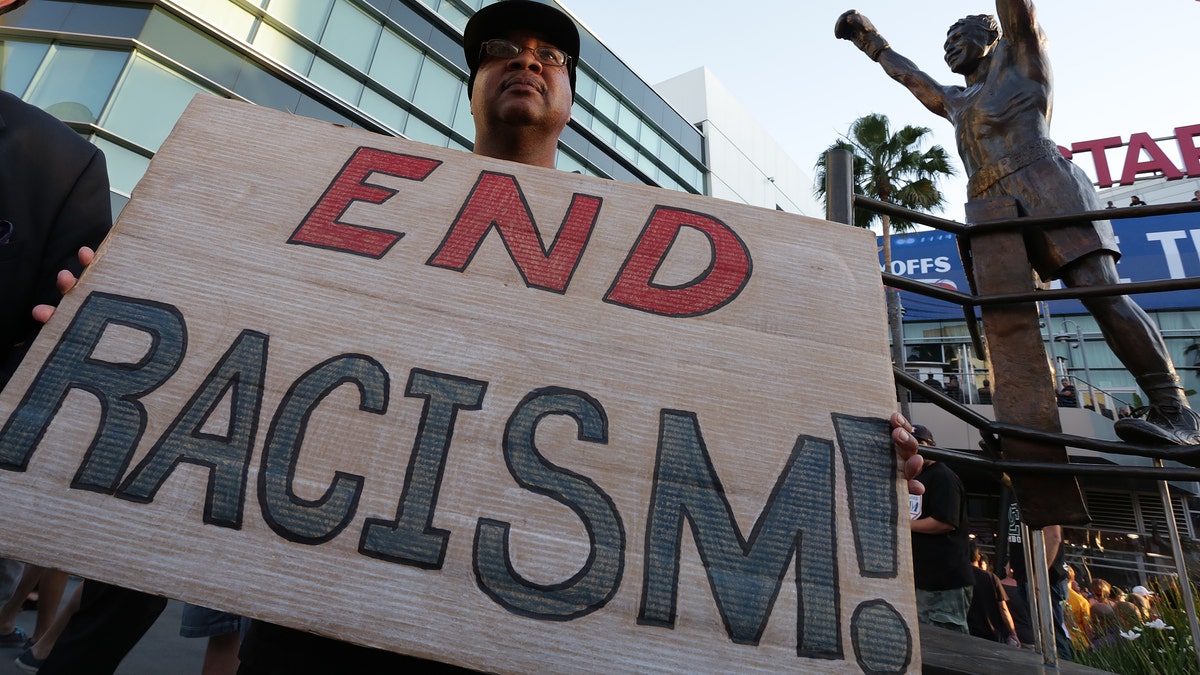
LOS ANGELES, CA - APRIL 29: Dexter McLeod holds a sign protesting racist comments made by L.A. Clippers owner Donald Sterling outside Staples Center before a playoff game on April 29, 2014 in Los Angeles, California. Clippers owner Donald Sterling was banned for life today by the NBA and barred from having any association with the team and ordered to pay a $2.5 million fine. (Photo by Jonathan Alcorn/Getty Images) (2014 Getty Images)
How much longer can we, one of the fastest growing minority groups in America, pretend that racism is not an issue within the Latino community?
To quote my friend, scholar, and poet Alysia Harris, “Some of us speak English because we were born and raised in America. Some of us are racist because we were born and raised in America…you think inside a racist hegemony. It is an unconscious choice even once politically correct language is acquired because racism is a part of your upbringing.”
We must begin to embrace an unchanging reality: Latinos come in many shades, and the diversity simply adds to the vibrancy of our culture.
Oxford Dictionary defines racism as the following: “Prejudice, discrimination, or antagonism directed against someone of a different race based on the belief that one’s own race is superior.” I contend that racism is rooted in privilege and power, and when asserted, is meant to create fear and to disempower an individual.
Often those who identify as Afro-Latino or as both black and Latino are treated as outsiders in our communities because many Latinos, in their assimilation to white American culture, carry the belief that being black means you are dangerous, that having a darker complexion means you are less.
As the issue of immigration continues to be a pressing one, as we continue to advocate for the needed reform, we must understand and acknowledge how varying shades of our brown and black skin plays a role in the anti-immigration debate. That while some of us have the privilege of being white, others do not, and racism is not just an issue for African Americans.
Some Latinos can walk into an establishment and not feel as if they are being watched because of their skin color. Some Latinos can turn on the television and see themselves showcased as the ideal beauty (i.e Jennifer Lopez and Shakira) but it’s a privilege to not be seen as a threat or less than beautiful. I am left wondering why the issue of assimilation, colorism, and white supremacy within the Latino community continues to often go unspoken of within our communities.
We see white privilege play out on Telemundo, a quick Google search will show you that the anchors are of lighter complexions. We see it in the roles given to white Latinos versus black Latinos in novelas, and America’s representation of the Latino community. A community where family is of much importance in our culture, by not addressing how we foster and support racism, we are neglecting the members of our community that are brown and black. We feed into the notion that black is not beautiful, not wanted, or loved.
“Many times I am asked why many Boricuas refuse to affirm their Blackness. I attribute this denial to the ever-rampant anti-Black sentiment in America and throughout the world, but I will not use this as an excuse. Often Puerto Ricans who assert our Blackness are … outcast by Latinos who identify more with their Spanish Conqueror than their African ancestors,” activist Rosa Clemente wrote in a recent blog post entitled "Who Is Black"?
In a study conducted by the Pew Hispanic Center in 2012, when asked to state their race a third (36 percent) called themselves white, a quarter (26 percent) said they are “some other race” and another quarter (25 percent) volunteered that they are “Hispanic or Latino” (even though the U.S. government doesn’t treat those labels as a race). Just 10 percent said their race is black, Asian or mixed. By comparison, on the 2010 Census form, 53 percent of Hispanics checked white.
The statistics reflect what I have come to learn and understand within my own family and it is that we are conditioned to aspire to whiteness, to be seen not as people of color, but as Americanos.
It is time that we start holding ourselves accountable for the ways we keep the vicious cycle of racism going. We must begin to embrace an unchanging reality: Latinos come in many shades, and the diversity simply adds to the vibrancy of our culture.








































